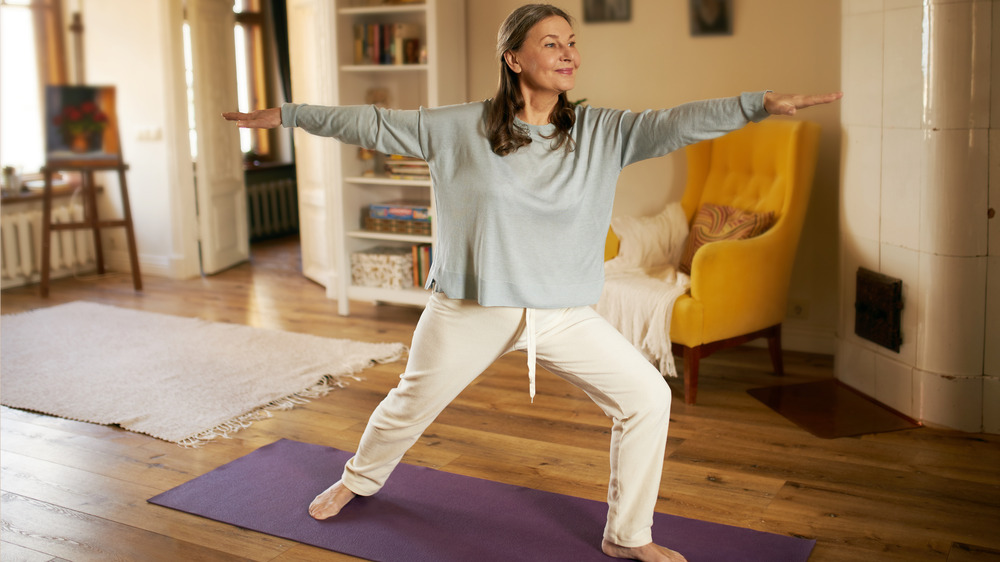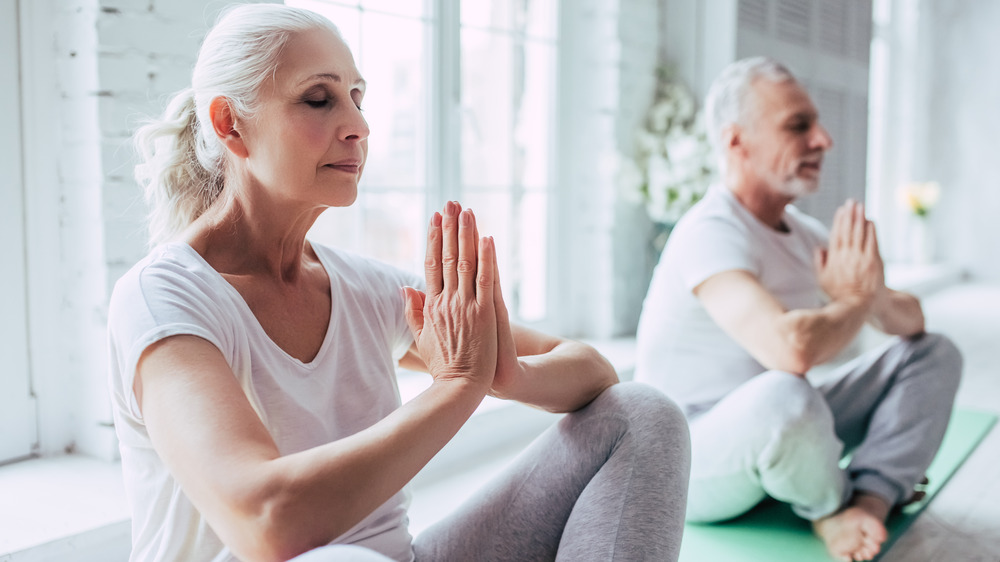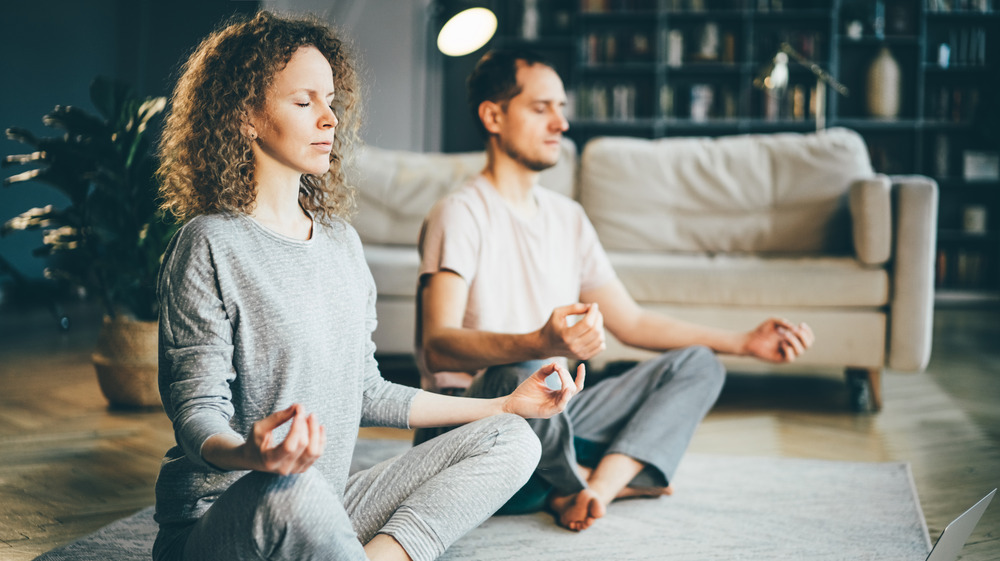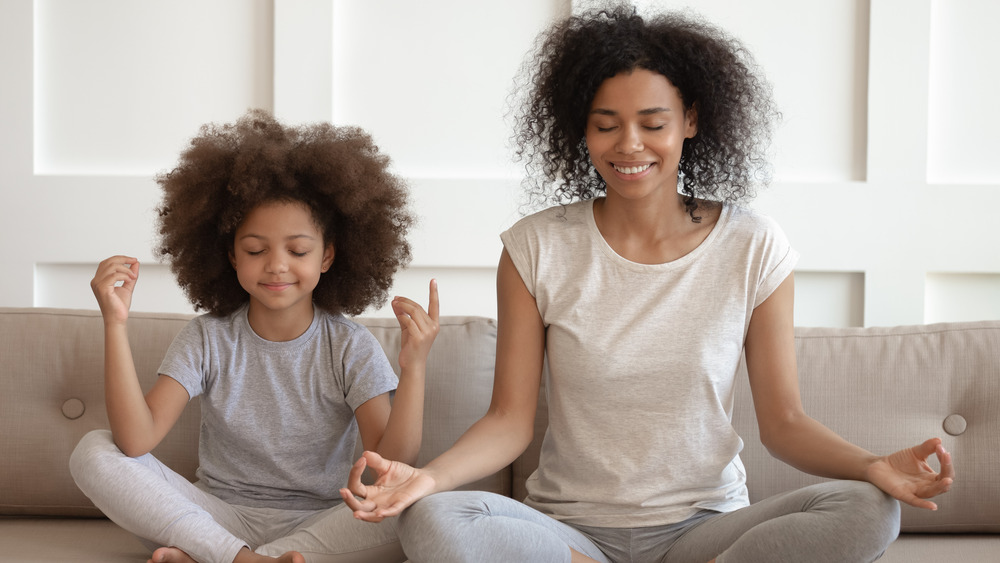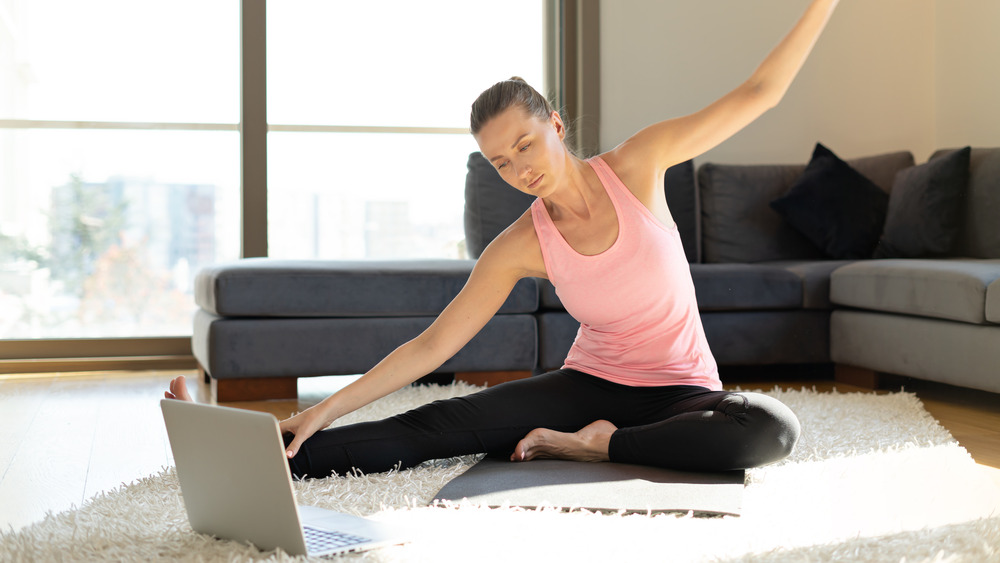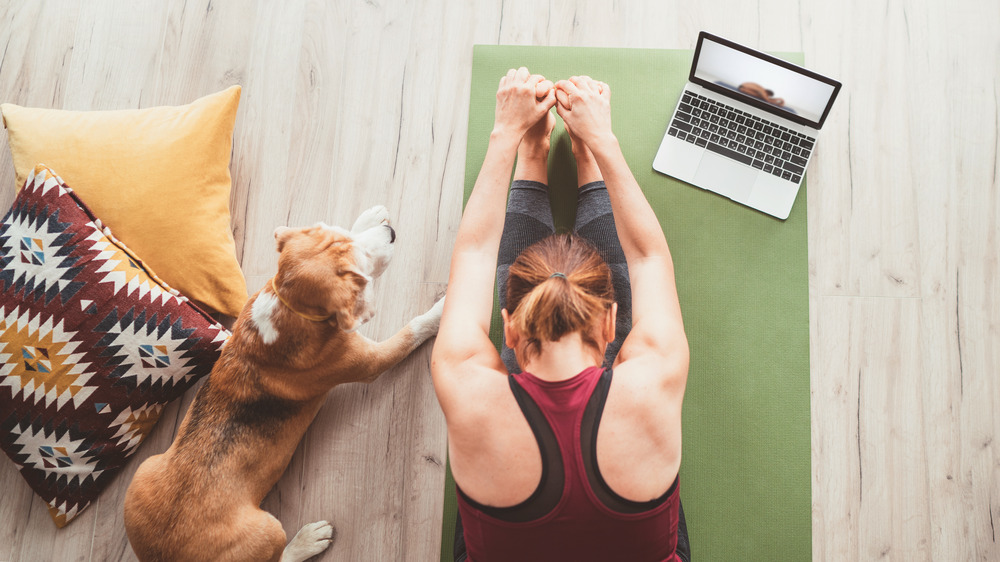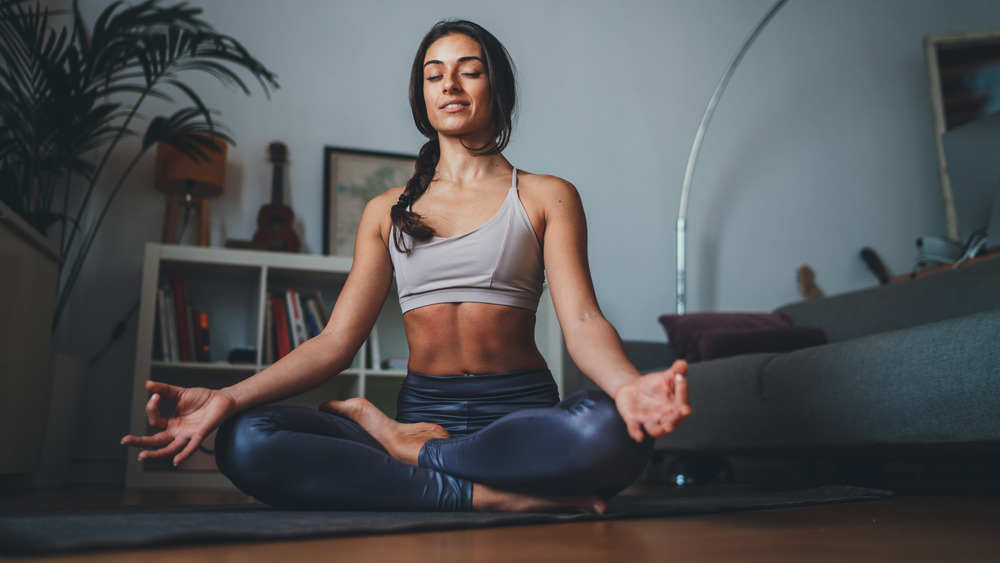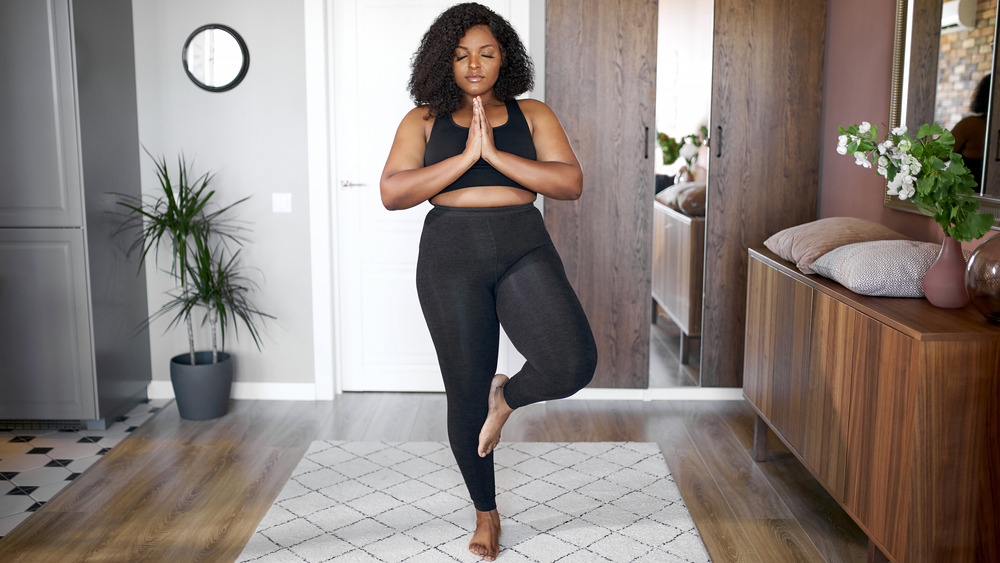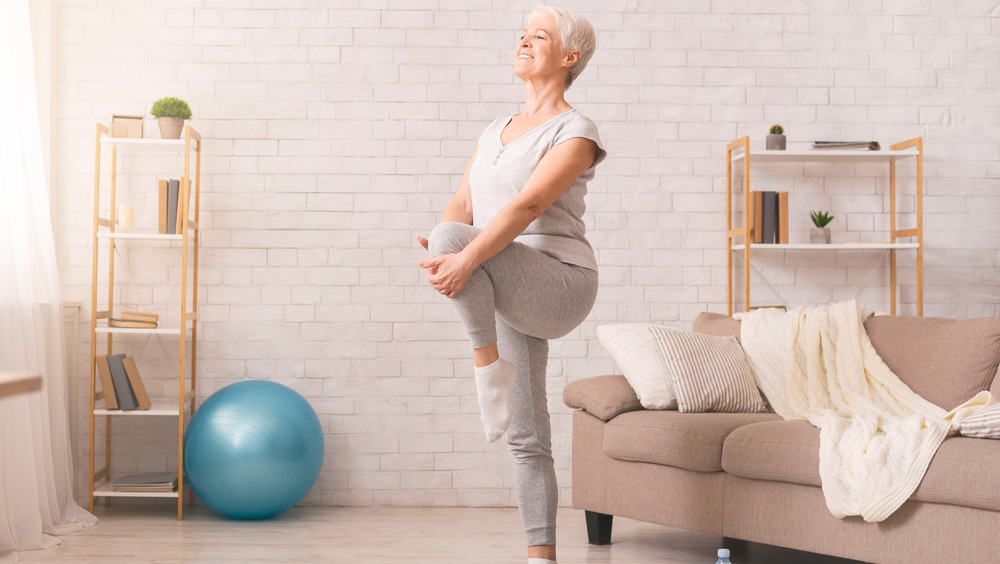What Really Happens To Your Body When You Do Yoga Every Day
It's no secret that yoga has undeniable health benefits — mentally, physically, and spiritually. After all, yoga has been around for quite some time now. Its origins can be traced all the way back to India some 5,000 yeas ago, when it was first mentioned in ancient sacred texts known as the Rig Veda, according to Google Arts & Culture. Today, yoga is still practiced all over the world. It's even combined with other medicines and treatment plans to heal patients inside and out.
Boiled down, yoga is a practice that combines strength, flexibility, and breath, but there are a multitude of ways to marry these factors — from Ashtanga and Bikram to restorative and Vinyasa yoga, according to Gaiam, a yoga gear and equipment retailer. All types of yoga utilize various breathing techniques and postures. Some are sweaty (ahem, hot yoga), while other forms of yoga are more relaxing. But they all serve a purpose.
Whatever form of yoga you choose, practicing every day can work wonders on your mind, body, and spirit. Whether you're a seasoned yogi or a total newbie, here are the beautiful ways that yoga can empower you to be a better version of yourself.
Do yoga every day and watch your balance improve
Yoga is all about holding and moving between different postures, which vary depending on the type of yoga that you practice. According to Johns Hopkins Medicine, both the slow movements and deep-breathing exercises in yoga boost blood flow and warm up your muscles. Not only can that make you stronger over time, but it can also improve your balance.
In fact, one review of research published in the Journal of Alternative and Complementary Medicine pinpoints 11 studies that found a positive correlation between the practice of yoga and improved balance. Of course, how often and for how long you practice yoga will determine just how big of an effect it will have on you. You may not be able to walk a tight rope or, you know, hold a one-legged pose over night (though some people are naturally more gifted at balancing than others). The longer you keep at it, the better your balance will become (via WebMD). You know what they say, after all: Practice makes perfect progress!
Practicing yoga will improve your flexibility
When is the last time that you tried to touch your toes? Can you do it? If you can, that's awesome for you! If you can't, you're so totally not alone. In fact, half of adults, at least in the U.K., can't touch their toes either (via Daily Mail). We're not sure that Americans are any more capable of this! But you can certainly improve your chances of touching those toes by hitting the yoga mat on the regular. That's right. Practicing yoga every day significantly improves your flexibility. According to Johns Hopkins Medicine, all of that stretching involved in your yoga practice can help you reach further and further over time.
Ever wonder how certified yogis can bend their bodies in such wild ways? While some of them may have been born with pure talent (and maybe double-jointedness), it's safe to assume that many of them worked their way to where they are. And the more you keep stretching on the mat, the more postures and poses you'll be able to achieve, too. Keep at it, and you'll be touching your toes in no time.
Daily yoga sessions can improve your heart health
You already know that there's a whole lot more to yoga than looking and feeling great in athliesure — although that's certainly a plus. Yoga has very real effects on your health. In fact, yoga even contributes to your heart health, according to Johns Hopkins Medicine. That's because regular yoga practice is known to reduce stress levels and inflammation around the body. Yoga can also bring down high blood pressure and help you lose excess weight, which are two major contributors to heart disease.
Because heart disease is the number one killer of both men and women across the United States, yoga is a smart sport for anyone to try. In fact, about 655,000 Americans lose their lives to heart disease every single year, according to the Centers for Disease Control and Prevention (CDC). That equates to about one in every four deaths total. It also means that the country loses one human life every 36 seconds due to the disease, the CDC detailed. Yoga could just be a part of the solution.
Do yoga every day and you'll likely sleep better
Have trouble falling or staying asleep? Maybe you even feel like you've tried everything in the books — melatonin pills, sleepy-time tea, soothing sound machines, cutting caffeine, et cetera. But have you tried practicing yoga every day?
Doing yoga on the daily can drastically improve your sleep, according to Johns Hopkins Medicine. And, no, you don't have to do any wild poses pre-bedtime for it to work. Side note: Getting your blood pumping is the last thing you want to be doing when you're trying to settle into sleep!
"There is some suggestion that certain postures may be helpful," Johns Hopkins sleep expert and physician Anastasia Rowland-Seymour told the institution. "But the benefits are more due to its meditative properties." Some styles of yoga that Rowland-Seymour suggested include hatha yoga, which focuses on your positioning, and nidra, which is a combination of restorative poses and breathing techniques. Many of these poses include sitting and lying postures, and many of the breathing techniques are intentionally calming. Slowing the heart rate and quieting the mind in these ways can help put you right to sleep. Some specific poses the sleep expert recommends are the legs-up-the-wall pose and corpse pose.
Yoga can improve your body image
Yoga can work wonders for your mental health. For one, practicing yoga can give you a major confidence kick. According to Harvard Health, yoga can have an impact on your body image for the better. "Yoga develops inner awareness," according to the Harvard site. "It focuses your attention on your body's abilities at the present moment. It helps develop breath and strength of mind and body. It's not about physical appearance."
If you think about it, most yoga studios don't have mirrors. This is intentional so that students can focus inward rather than on how they look or the people around them. And it works! People who practice yoga tend to be more aware of their bodies and more satisfied with them. They're not as critical of their bodies as people who do not practice yoga. Instead, they are usually more grateful for the many ways that their bodies serve them.
Doing yoga every day can help you lose weight or maintain a healthy weight
If you're looking to lose weight or maintain a healthy weight, yoga is one way to do just that. This might sound surprising since you don't always break as much of a sweat in yoga as you do in high-intensity workouts. (Though you can certainly push yourself to the limits in certain yoga practices, as well!) But because people who practice yoga are more attuned to their bodies, they may be more cognizant of their hunger and fullness cues, according to Harvard Health. As such, they tend to be more mindful eaters. And more mindful eaters tend to have better control over their bodyweight. It's simple math.
In fact, people who practice yoga for at least a half-hour once a week for four or more years gained less weight throughout middle adulthood than those who didn't, Harvard Health revealed. And those who were overweight actually lost weight by practicing yoga this much. Overall, their body mass indexes (BMIs) were lower than those who didn't practice yoga.
Yoga can help to alleviate stress
Frankly, we live in a stressful world. Think of the rising cost of living coupled with higher-than-ideal unemployment rates. Not to mention burgeoning debt, climbing divorce rates, a pandemic. overpopulation of the planet, suffocating climate change — whew, the list just keeps on going.
If you're feeling overwhelmed with constant stress or even just pangs of stress here and there, you're certainly not alone. In fact, everyone feels stress at some point in their lives. It's a totally natural reaction to life experiences, according to the American Institute of Stress. Some level of short-term stress can even be a good thing for you. But too much stress can take a toll on your health. Chronic stress can, ultimately, be deadly.
According to the Mayo Clinic, however, yoga can help to lower your stress levels. Not only can it enhance your mood overall through the release of endorphins (as can all workouts, by the way), but it can also help you manage the symptoms of stress. Breathing techniques used in yoga, for example, can help to regulate your heart rate, which may increase with stress. And, the more you practice yoga, the better you'll become at managing stress symptoms.
Daily yoga supports a healthy immune system
Yoga promotes good health as it can actually strengthen your immune system. That's right, folks. Practicing yoga every single day can make you less susceptible to illnesses by boosting your body's natural responses to them. Because yoga can decrease stress, it can also have an effect on your immune system, according to a 2011 study published in the International Journal of Yoga.
"Stress may be defined as psychophysiological process usually experienced as a negative emotional state," the researchers write. "It is a common condition, a response to a physical threat or psychological distress that generates a host of chemical and hormonal reactions in the body. The health effects of stress involve mainly autonomic, cardiovascular, and immune systems." The researchers set out to see whether or not yoga would positively impact the health effects that stress has on the immune system. And, as it turns out, it does.
Practicing yoga every day can help you manage chronic pain
An estimated 50 million Americans are living every single day with chronic pain, according to the U.S. Pain Foundation. You, too? Roll out that yoga mat. According to the Mayo Clinic, yoga can help to treat chronic pain — or at least help you better manage the symptoms of it.
Whether you're experiencing lower back or neck pain, going through menopause, or dealing with arthritis, yoga can help to relieve some symptoms. And, the more you get into it, the more it can help. So if you're someone who is constantly uncomfortable thanks to aches and pains, it could just be time to open up YouTube or download a yoga app.
Restorative yoga, in particular, can be key to managing chronic pain, Yoga International suggested. A few moments of gentle poses and conscious breathing can, together, help to get you through even the toughest days.
Your focus may improve if you practice yoga every day
Unable to focus? If it feels like there aren't enough hours in the day to check off everything that takes up space on your to-do list, it may just be because you're not laser-focused. When you improve your focus, you improve your efficiency and, ultimately, your productivity. And one surefire way to boost focus is by practicing yoga.
According to a study published in the Journal of Physical Activity and Health, just a half-hour or less of yoga improved the participants' speed and accuracy when it came to their memory and inhibitory control. These two measures of brain function are closely related to your ability to focus, absorb, remember, and actually use new information.
"The breathing and meditative exercises aim at calming the mind and body and keeping distracting thoughts away while you focus on your body, posture, or breath. Maybe these processes translate beyond yoga practice when you try to perform mental tasks or day-to-day activities," Neha Gothe, who led the study, told Illinois News Bureau.
A daily dose of yoga can help relieve anxiety
If you experience anxiety, rest assured that you're not the only one. In fact, anxiety disorders are the most common mental illnesses in the United States. Specifically, about 40 million American adults (or 18.1 percent) are affected by anxiety every year, according to the Anxiety and Depression Association of America. And while anxiety can be treatable, only 36.9 percent of people with the disorder seek and receive treatment. Why? There are a whole host of reasons, from denial to the stigma surrounding mental health conditions (via Sydney TMS). One way you can help to treat your anxiety is by practicing yoga, according to a 2020 study published in JAMA Psychiatry (via ScienceDaily).
"Generalized anxiety disorder is a very common condition, yet many are not willing or able to access evidence-based treatments," Dr. Naomi M. Simon, physician, professor in the department of psychiatry at NYU Langone Health, and the lead study author, told ScienceDaily. "Our findings demonstrate that yoga, which is safe and widely available, can improve symptoms for some people with this disorder and could be a valuable tool in an overall treatment plan."
This doesn't mean yoga should be your sole treatment plan, but as ScienceDaily noted, the study did find that yoga "meaningfully improves" anxiety symptoms. Of course, as with anything, you have to keep it up to reap the rewards.
Practicing yoga may improve your posture
Poor posture? It's fixable, we promise. If you find yourself slouching all the time, you can work on training your muscles to help you stand up straighter. This may be especially useful for people who work in offices, hunched over their computers all day long. According to a 2015 study published in the Journal of Physical Therapy Science, yoga, in particular, can help to improve your posture.
The researchers looked at 56 women, 24 of whom self-reported practicing hatha yoga at home with the yoga exercise sets provided to them as part of the study. Six of the women practiced yoga once or twice a week, and 18 practiced yoga three to five times per week. Additionally, 93 percent of the women attended 90-minute hatha yoga classes once per week for a total of 20 weeks. And they were better for it!
The results of the study suggest a "statistically significant increase of spine flexibility." Interestingly, "age and practicing yoga postures at home had no effect on the changes." All said and done, these women were better able to touch their toes and more comfortably stand up straight. Oh, and they shed some excess weight in the process.
Yoga can give you a self-esteem and energy boost
Feeling sluggish? Lethargic? Half dead? Or perhaps you're feeling blah about yourself, experiencing that all-too-familiar imposter syndrome. Whether you're feeling down in the dumps or completely rundown, yoga may be able to give you the boost you need to kickstart your day.
According to a 2017 study published in Frontiers in Psychology, practicing certain poses can give you that oomph. More specifically, "the effects of performing open, expansive body postures may be driven by processes other than the poses' association with interpersonal power and dominance." So if you choose a standing, open pose, for example, and practice it even for just two minutes, you might witness some positive effects — from improving your self-esteem to your sense of energy. Sure, you might not feel like rolling out your mat to practice when you first wake up, but you may find it well worth the work.
A daily yoga practice may make you happier and improve your overall well-being
At the end of the day, you should always do what makes you happy. If something isn't serving you, why engage with it? The good news is that, according to a 2020 Project Happiness report, yoga indeed leads to increased happiness. So, you know, just in case you need one more reason to practice yoga every day, yoga can quite literally change your life for the better.
"Very few people know that happiness plays an important role in maintaining good health both mental and physical," writes Dr. Anil Kashyap, doctor of philosophy. "Not only this, but happiness also has positive effects on a person's productivity, well-being, public behavior, and mutual relations." He concludes that some yogic practices can enhance the level of happiness in your life. Others agree. "By improving mindfulness, it simultaneously helps to boost compassion, gratitude, and 'flow' states, all of which contribute to greater happiness," Harvard's Healthbeat explained. And who could say no to all that?


